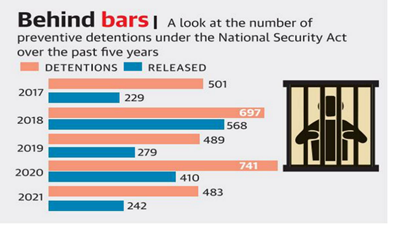

Context
The latest crime statistics released by the National Crime Records Bureau (NCRB), have reported a rise in Preventive detentions in 2021 of about 23% compared to 2020.
About
What is Preventive Detention?
|
Two Types of Detentions:
|
- Preventive detention refers to taking into custody an individual who has not committed a crime yet but the authorities believe him to be a threat to law and order.
Constitutional safeguard against misuse of preventive detention:
- Article 22 (2): Every arrested person must be produced before a magistrate within 24 hours after arrest.
- Article 22 (4): It provides that no law for preventive detention authorizes any individual to be detained for more than three months unless an advisory panel claims a reasonable justification for such detainment.
- Article 22 (5): It specifies that the reason for detention shall be conveyed to the individual as quickly as possible by any official when detaining any individual under preventive detention.
Key Highlights of the National Crime Records Bureau (NCRB) Data:
- The Highest number of Detention: A total of over 24,500 people placed under preventive detention were either in custody or still detained as of the end of 2021, the highest since 2017 when the NCRB started recording this data.
- In 2017, the NCRB’s Crime in India report found that 67,084 persons had been detained as a preventive measure that year.
- Of these, 48,815 were released between one and six months of their detention, and 18,269 were either in custody or still in preventive detention as of the end of the year.

- Detentions under the National Security Act: Over 483 were detentions under the National Security Act, of which almost half (241) were either in custody or still detained as of 2021-end.
- State and Union Territories: Tamil Nadu followed by Telangana and Gujarat recorded the most preventive detentions in 2021 among the States while Jammu and Kashmir recorded the highest number of such detentions in Union Territories (UTs).
Various provisions invoked for Preventive Detention (no: of cases)
Among other laws under which the NCRB has recorded data on preventive detentions are the:
- Goonda Act (State and Central) (29,306)
- Prevention of Illicit Traffic in Narcotic Drugs and Psychotropic Substances Act, 1988 (1,331)
- A category classified as “Other Detention Acts”, under which most of the detentions were registered (79,514).
- Since 2017, the highest number of persons to be placed under preventive detention has consistently been under the “Other Detention Acts” category.
- In addition to the above-mentioned provision, several other laws provide the basis for preventive detentions, for example:
- Unlawful Activities (Prevention) Act
- Maharashtra Control of Organized Crime Act also provides for making preventive detentions.
Issues with preventive detention
- Arbitrariness: The police determinations of whether a person poses a threat are not tested at a trial by leading evidence or examined by legally trained persons.
- Rights violation: Quiet often, there is no trial (up to 3 months), no periodic review, and no legal assistance for the detained person.
- Abuse: It does not provide any procedural protections such as to reduce detainees’ vulnerability to torture and discriminatory treatment, and to prevent officials’ misusing preventive detention for subversive activities.
- Tool for suppression: In the absence of proper safeguards, preventive detention has been misused, particularly against the Dalits and minorities.


